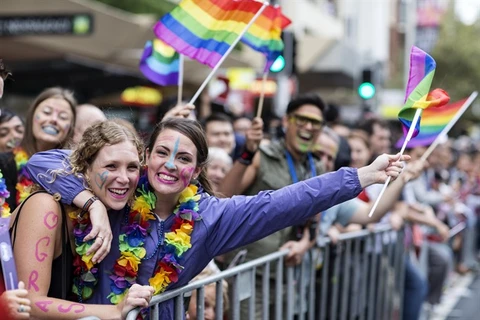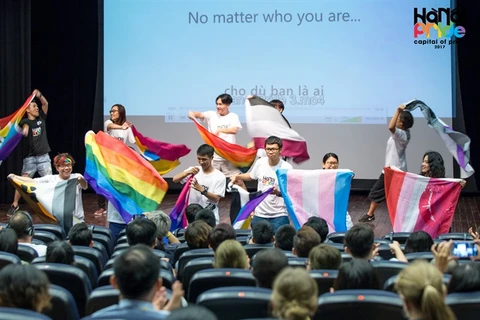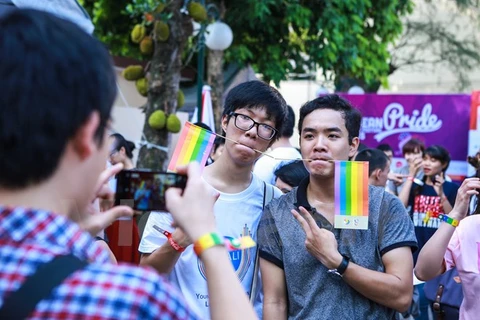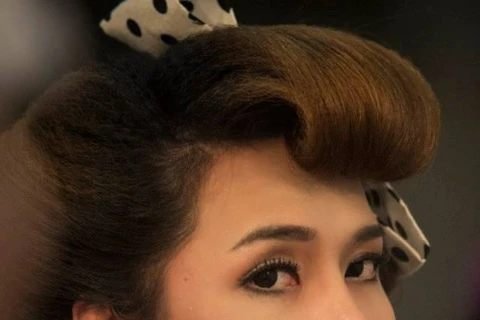 Nguyen Huong Giang, with her beauty and intelligence, shines at Miss International Queen 2018 (Photo: Dep magazine/VNA)
Nguyen Huong Giang, with her beauty and intelligence, shines at Miss International Queen 2018 (Photo: Dep magazine/VNA) Hanoi (VNA) - Nguyen Huong Giang, a Vietnamese transgender woman, on March 9 won Miss International Queen 2018 - the world’s largest transgender pageant.
Giang was happy with the victory, as was the LGBT (Lesbian, Gay, Bisexual, Transgender) community as it marked a remarkable step in their endeavors to earn social acceptance in Vietnam.
“My triumph comes at a time when the government is considering legally recognising sex reassignment. I hope the Government will soon do this to ensure the rights of the LGBT community,” she told the Vietnam News Agency (VNA).
Invisible, alone struggle
Just a decade ago, homosexuality was still something many Vietnamese people didn’t understand.
They thought homosexuality was a “disease” or associated with social vices such as murder, robbery and theft, as the media then demonised the LGBT community.
“When I decided to go through with sex reassignment surgery, I faced severe objections from my family, relatives and friends,” Huong Giang said.
“I had to go through that alone, with no one beside me, and I had to be strong to get what I have today. There was a time I thought I was going to die.”
A survey on LGBT youth conducted in 2015 by Save the Children and the Institute of Social & Medical Studies showed that schools in Vietnam remained hostile for LGBT students as 58.3 percent of them were bullied or harassed by their peers and 23 percent said that their teachers and school staff also took part in the harassment.
Meanwhile, according to the 2016 study titled “Is it because I am LGBT” carried out by the UN Development Programme in Vietnam, about 30 percent of 2,363 respondents from 63 localities said that they had been denied a job for being LGBT, and 40 percent encountered negative comments and foul acts.
“At school, peers and teaching staff often teased me or made fun of me, as well as spread rumours about me,” Le Cong Thang recalled.
Thang knew he was gay at a very young age.
“In my previous workplace, my co-workers often laughed at my sexuality and sexual orientation behind my back,” he said. “They made it hard for me to finish work on time and spread rumours as well.”
He is working for a big company in Hanoi.
“I’m not the only one, many others in the community face the same struggle.”
“Most of them are offended by their parents and relatives, bullied by their peers and slandered by their co-workers.”
Visible, initial wins
In 2008, the Information Connecting and Sharing (ICS) Centre was set up, becoming the first LGBT civil-society organisation working on LGBT rights.
It was followed by the Institute for Studies of Society, Economics, and Environment (iSEE), the Centre for Creative Initiatives in Health and Population (CCIHP), and the Centre for Studies and Applied Sciences in Gender, Family, Women and Adolescents (CSAGA).
Their purpose was to support LGBT persons, giving the public, the media and the Government and policymakers a better understanding of LGBT people and the challenges facing them.
Various discussions have been held, many surveys conducted, and activities launched to make LGBT people’s presence known in society.
The iSEE, with support from Oxfam, implemented a project aiming to eliminate societal discrimination against LGBT people in Vietnam.
One of the first activities of the project was a training programme to update the media with knowledge on the LGBT community held in Ha Long Bay, the northern province of Quang Ninh in 2009.
In late November 2009, iSEE and ICS Centre held a series of events on homosexuality. From November 27-29, an exhibition took place at the Ho Chi Minh City Youth Union’s Cultural House, showcasing 56 paintings and photos, depicting homosexual people’s desire to come out and integrate into the community.
“This exhibition is one among numerous activities making society understand more about the LGBT community. Therefore, everyone can share and open their hearts to LGBT persons, so LGBT persons can open their hearts to others as well,” said iSEE Director Le Quang Binh.
On February 25, 2011, the Vietnamese film on lesbians titled “Duong nao di toi bien” (Which Way To The Sea) was screened at the Hanoi Cinematheque.
Produced by CSAGA under the assistance of the Swedish Embassy in Vietnam, the 35-minute documentary features the lives of five lesbian couples who represent lesbian communities in three regions in Vietnam and explores how Vietnamese women cope after coming out. It finishes with the small but simple dreams of lesbian couples that are sometimes difficult to fulfil, such as wearing a wedding dress, owning a house, or simply earning a stable income.
Many non-LGBT people raised their voice to support the LGBT community and their rights.
 Young people shout "Yes, I do" to show support for the LGBT community at an event held by iSEE and ICS (Photo: VNA)
Young people shout "Yes, I do" to show support for the LGBT community at an event held by iSEE and ICS (Photo: VNA) In a report sent to the Ministry of Justice in 2013, Deputy Health Minister Nguyen Viet Tien affirmed: “In the angle of human rights, homosexuals also have the right to live, eat, wear, love and be loved and pursue happiness. In the angle of citizenship, they have the right to work, study, have medical examination and treatment, register birth, death and marriage, and perform their obligations with the State and society”.
Everyone deserves a good life
There is no accurate data on the number of LGBT people in Vietnam as many have yet to come out, but a survey done by the iSEE indicated Vietnam is home to about 1.6 million LGBT people.
LGBT people have also tried their best to be recognised by their families, friends and the society.
Just months after sex reassignment surgery in Thailand, Huong Giang, born in Hanoi in 1991 as Nguyen Ngoc Hieu, registered to join Vietnam Idol 2012, a renowned singing contest in Vietnam, and finished fourth.
Since then, Giang has never stopped trying to improve and become Miss International Queen. Together with the crown, she also won Best Talent and Most Popular Introductory Video awards.
“Huong Giang and many other transgender people working in all aspects of the society are contributing to erasing gap, bringing their stories to the public to help the public understand and respect transgender people in particular, and the LGBT community in general,” said iSEE Director Luong Minh Ngoc.
 The new Miss International Queen calls for the public not to look down on anyone as everyone has the right to be happy (Photo: Dep magazine/VNA)
The new Miss International Queen calls for the public not to look down on anyone as everyone has the right to be happy (Photo: Dep magazine/VNA) When asked what message about LGBT people she would like to deliver, the new Miss International Queen stated that like everyone, LGBT people want to live a good life to contribute to the society’s development.
She also called for the public not to look down on anyone. “Everyone in the world has the right to be happy”.-VNA
NEXT: [Rainbow flag movements make inroads in Vietnamese]
VNA
























